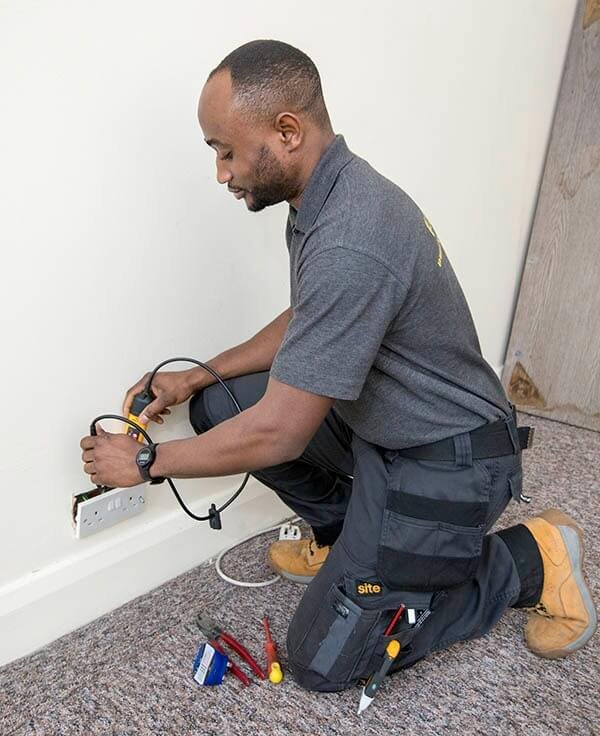Choosing the right local electrician near me can save a business a project’s worth of money and time. Be it an industrial installation, updating an office’s electrical systems, or even doing standard maintenance on critical infrastructural systems, where and whom the business decides to hire will determine the outcome and if the safety benchmarks as well as the long-term operational reliability will be achieved.
There has been a rapid growth in the specialization of the electrical industry. New implementations in the field of modernization have to be paired with traditional electrical work, automation systems, and modern technologies. Due to this, not all electricians are the same, meaning the right professional will have to be chosen within the wider scope of many criteria outside just basic qualifications.
To understand the gap and the difference between exceptional electrical service providers and the average Joe, make sure to equip the decision-maker with the right tools to shield their investment and make certain that the systems work at their best. The risks when it comes to commercial and industrial setup are too high because electrical failures can cause a business to waste a severe amount of time, incur hefty safety risks, and even a greater financial loss.

Professional Licensing and Certifications
A solid base for any electrical professional begins with proper licensing and certifications. For instance, a licensed electrician near me should possess the proper credentials for your region. They, however, should not be too far out of your area. With that in mind, local licensing regulations differ from place to place and hiring a professional can be tricky because of these differences.
In addition to the basic license, professionals with specialized certifications relevant to your needs should be prioritized. For instance, industrial electricians should be certified in motor control, power systems, and industrial automation. Building management systems, energy efficiency, and some specific manufacturer training programs are also certifications that a commercial specialist might hold.
Electricians with ongoing training and updated certification show a commitment to excellence and the industry, making that a critical factor in assessing electrical professionals. Changes to the electrical industry happen often, with new technologies, codes, and best practices. These changes, along with the willingness to undergo training, represent professional development.
Manufacturer Certifications and Specialized Training
Specific systems or equipment in electrical projects may require an in-depth specialist’s knowledge. Manufacturer certifications from companies like Schneider Electric, ABB, and Siemens, or other large equipment vendors, denote that an electrician has received a specific product and systems training. As part of these certifications, a practitioner may receive in-depth manuals and guides, real-world training, and brand-aligned training that provides equipment and product documentation and ongoing maintenance and training support.
With the ongoing integration of advanced control systems, the value of industrial automation certifications is increasing. Integrated projects that require electrical and control systems work are more valuable when supported by trained professionals in programmable logic controllers (PLCs), human-machine interfaces (HMIs), and industrial networks.
Technical Expertise and Specialization Areas
Your project needs should determine the specific breadth and depth of technical expertise needed. The basics of electrical knowledge is important, but proficiency in related disciplines can also add value to the success of the project. Knowledge of motor control systems, power distribution, and industrial safety is a must for professionals operating in industrial facilities.
Commercial electrical projects are centered around the installation of building automation systems, advanced energy performance technologies, and their integration with HVAC, security, and communications systems. The competent electrician for the job must not only understand these systems but also their holistic performance-driven relationship with the electrical systems of the building.
As sensitive electronic devices become more common in commercial and industrial locations, power quality expertise has become crucial. Troubleshooting equipment with issues related to harmonics, power factor correction, voltage regulation, and other power quality concerns requires trained electrical professionals with deep understanding due to the impact these factors have on efficiency and power costs.
Experience with Advanced Technologies
Installation of modern electrical systems is beginning to include more advanced innovations like variable frequency drives, smart sensors, energy management systems, and integration of renewable energy. Professionals with hands-on experience in these subjects can provide valuable insights during the planning and ensure the installations and commissionings are done properly.
Integration of building management systems requires the knowledge of electricity and communication protocols. Electricians who can work collaboratively with other professionals like building automation experts, IT specialists, and facility managers add great value to complex commercial projects in multipliable systems in one building.
Project Management and Communication Skills
Success of a project requires more than technical skills. Effective management of the project involves the scheduling, budget, and integration of electrical work with other maintenance or construction activities. Look for specialists with strong organizational skills and a systematic way of executing projects.
Great communication skills are essential, especially for intricate projects that have many parties involved. Explaining technical concepts, providing updates, and coordinating schedules requires a high level of communication. Effective execution of extensive communications can influence a project’s success or result in financial setbacks due to misunderstandings and delays.
Attention to detail is as important as professionalism. A quality-focused electrical specialist preserves comprehensive project records, such as as-built drawings, relevant electrical tests, warranties, and maintenance advice, which reinforces the system’s long-term dependability.

Coordination with Other Professionals
Various parties, such as architects, engineers, or even general contractors, are crucial for the success of an electrical project. Electrical contractors who show well-organized collaborative relationships and good communication skills are more likely to facilitate the smooth progress of the projects while achieving the broader goals.
Adhering to a project management system is very crucial for tall commercial and industrial projects. Understanding construction schedules, change orders, quality control, and reporting protocols is essential for the execution of the project.
Safety Standards and Practices
Due to the nature of electrical work, safety is always the first to be considered. For professional electricians, the requirements of electrical safety standards, personal protective equipment, safety checklists to avoid workplace hazards, and general policies on safety protocol should be areas of their complete and in-depth comprehension. Professionalism, competence, and safety records tell a great story about how a person manages risks.
National and local electrical codes establish minimum safety requirements. Exceptional professionals often exceed the minimum. Safety records documenting past performance and adherence to OSHA and other regulatory bodies in the industry are critical in setting the standards required to meet. Safety records tracking past performance in the industry are a great place to start.
The safety culture of a company is broader to include team training, equipment maintenance, systematic hazard identification, and other processes. As a near me electrician, I come to appreciate the stronger safety cultures because I know they will be less of a liability to my clients.
Emergency Response and Troubleshooting Capabilities
Electrical emergencies can occur at any time, potentially causing significant disruption to operations. Evaluate potential electrical partners based on their emergency response capabilities, availability for urgent repairs, and troubleshooting expertise. The ability to quickly diagnose and resolve electrical problems can minimize downtime and operational impacts.
Preventive maintenance capabilities complement emergency response services by helping identify potential issues before they cause failures. Professionals who offer comprehensive maintenance programs demonstrate understanding of long-term system reliability and client operational needs.
Equipment and Technology Resources
Modern electrical installations require sophisticated tools, testing equipment, and technology resources. Evaluate potential partners based on their investment in current tools and diagnostic equipment. Thermal imaging cameras, power quality analyzers, and advanced testing instruments enable more accurate diagnosis and higher quality installations.
Access to specialized equipment for specific applications can be particularly important for complex projects. Industrial motor testing equipment, high-voltage testing capabilities, and specialized installation tools may be necessary for certain types of work.
Technology resources extend beyond physical tools to include software capabilities for design, analysis, and documentation. Computer-aided design software, load analysis programs, and project management systems contribute to more accurate planning and execution of electrical projects.
Testing and Commissioning Capabilities
Proper testing and commissioning ensure that electrical systems operate safely and efficiently from day one. Look for professionals who have comprehensive testing procedures, appropriate equipment, and systematic approaches to system validation. Documentation of test results provides valuable baseline information for future maintenance and troubleshooting activities.
Commissioning services may include training for facility staff, development of operating procedures, and establishment of maintenance schedules. These value-added services contribute to long-term system performance and reliability.
References and Track Record
Past performance provides the best indicator of future results. Request and carefully evaluate references from similar projects, paying particular attention to project complexity, timeline adherence, budget performance, and overall client satisfaction. Speaking directly with previous clients often reveals insights that aren’t apparent from written references alone.
Industry reputation and standing within professional organizations provide additional perspective on electrical professionals’ competence and reliability. Active participation in trade associations, professional development activities, and industry events indicates commitment to excellence and staying current with industry developments.
Project portfolio diversity can be either an advantage or disadvantage, depending on your specific needs. Specialists who focus on particular types of work may offer deeper expertise, while generalists might provide more flexibility and broader perspective.
Quality Assurance and Warranty Provisions
Quality assurance processes and warranty offerings reflect confidence in workmanship and materials. Comprehensive warranties that cover both labor and materials for reasonable periods demonstrate commitment to client satisfaction and system performance. Clear warranty terms and responsive service support contribute to long-term value.
Quality control procedures during installation help ensure that work meets specifications and performance requirements. Regular inspections, testing protocols, and systematic documentation contribute to higher quality outcomes and fewer post-installation issues.
Cost Structure and Value Proposition
While cost is always a consideration, focusing solely on initial price often leads to suboptimal outcomes. Evaluate the complete value proposition, including service quality, warranty provisions, ongoing support, and long-term reliability. Sometimes paying slightly more for superior service and expertise results in significant savings over the system’s lifetime.
Transparent pricing structures and detailed project estimates help avoid surprises and enable accurate budget planning. Be wary of estimates that seem unusually low, as they may indicate corner-cutting, inexperience, or potential for significant cost overruns as project complexities emerge.
Value-added services such as energy audits, efficiency recommendations, preventive maintenance programs, and staff training can provide additional benefits that justify higher initial costs. Consider the total cost of ownership rather than just initial installation expenses.
Conclusion

Finding a local electrician near me isn’t just a matter of checking a box. There is a multitude of factors one must take into account, and these factors go well beyond the pricing and qualifications of the electrician. Communication, technical knowledge, safety, and long-term support all factor into the reliability of the electrical systems and project outcomes.
Having professionals that know both the fundamentals of electrical systems and the latest technologies is vital for modern electrical installations. The complexity of electrical systems today, from building automation to energy management, requires that professionals with a diverse set of skills, both traditional and cutting-edge, are employed.
Investing the time and effort into researching and collecting references for electrical professionals is well worth the return, and saves the customer a lot in the long run. Evaluating the safety, project outcomes, and system reliability are all factors that benefit from making a thorough evaluation. Spending time evaluating safety, project outcomes, and system reliability are all long term benefits.
IET is the leading company in electrical engineering in East Africa, serving Kenya, Uganda, and Tanzania for over 75 years. We specialize in power transmission, power distribution, industrial automation, building management systems, and sophisticated motor control. Our electrical engineering experts possess the necessary qualifications, technical expertise, and proven project management skills to achieve exceptional outcomes for your sophisticated electrical engineering projects. IET can assist you in routine maintenance, major installations, specialized testing, and other challenging electrical engineering projects. Reach out to IET today to learn more about how we can help you optimize your electrical infrastructure.
